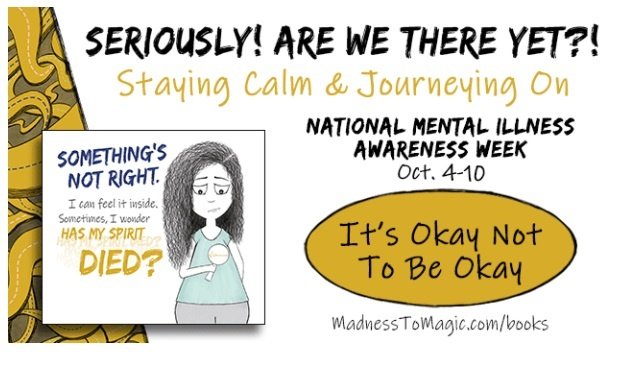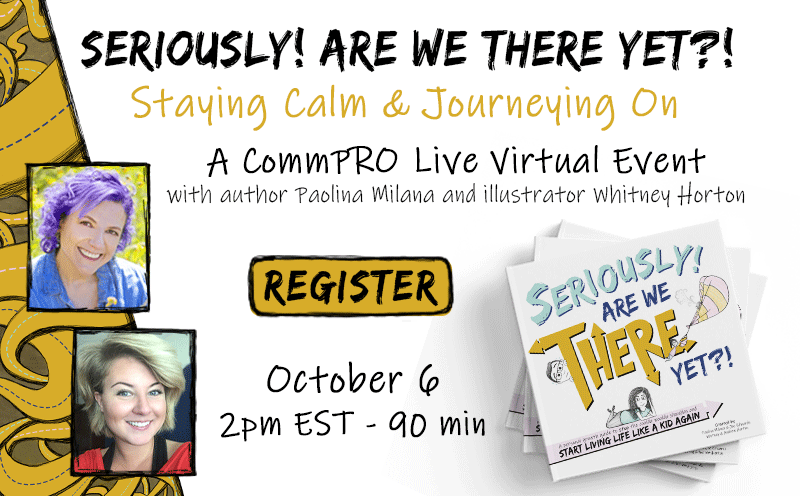Better Understanding of What It Means to Not Be Okay
 Paolina Milana, Author & Founder of MadnessToMagic.com
Paolina Milana, Author & Founder of MadnessToMagic.com
My husband broke his ribs in a motorcycle accident. I was grateful his injuries weren’t even more serious. When he was released from the hospital, he wasn’t sent home swaddled in bubble wrap. He didn’t have a single scratch on him. No stitches. No cast. No visible black and blue marks. From the outside, he looked perfectly fine. But inside, every breath he took and every movement he made caused him excruciating pain.
“How are you feeling?” I would ask.
“I’m okay,” he’d respond.
He wasn’t.
That’s how I’ve come to think about mental illness. But unlike a physical condition like a broken bone we can point to, knowing the source of our pain and trusting that it will mend, a mental or emotional illness isn’t as easy to diagnose, treat, and come to terms with (if it’s our own) or deal with (if it’s a challenge that someone else in our lives is navigating).
Think of how many times we’re asked in passing – by the grocery store clerk we encounter when shopping or a colleague we work with during a ZOOM call -- “How are you today?” only to respond, “Okay!” – even when we may be feeling anything but.
Mental illness awareness week is an opportunity to better understand “not being okay.” While we won’t cover everything related to it in this short article, we can touch on a few key points, starting with the definition of mental illness. Often, the words mental illness and mental health are used interchangeably, but they aren’t the same.
Mental health is similar to physical health in that for both we are mindful of and taking actions to help ensure all-around wellness. Physically, that might mean eating well and exercising daily. Mentally, that refers to our thoughts and feelings and emotions, and making sure we’re able to overcome challenges and to deal with whatever life throws our way. For both physical and mental health, there are varying degrees: Think Olympic swimmer Michael Phelps versus the landlubber/couch potato (like in me), or consider happy-go-lucky Winnie the Pooh versus glass-half-empty Eeyore.
Mental illness is also similar to a physical illness in that for both some disorder is impacting how we are able to function. Physically, that might mean we’ve been diagnosed with something like cancer – abnormal cells are dividing uncontrollably within us and have the power to destroy normal body tissue. Mentally, an illness refers to some disorder that is impacting our thoughts, feelings, behaviors and interactions with ourselves and with others – these include depression, anxiety, PTSD, schizophrenia or eating disorders.
People who have a mental illness more often than not keep it hidden. Unlike telling others that you have (for example) cancer, which while difficult is accepted by society, telling people you have (for example) bipolar disorder is still shrouded in shame and brings with it a certain stigma. The fear of being labeled with a mental illness stops people from seeking help.
This week in October, we can take steps to help change that. Taking it upon ourselves to become more aware of mental illnesses as health conditions that are of no fault of the people who have them, but rather, are medical conditions that are treatable is a simple start to understanding what it means to not be okay – and to help ourselves and others realize that it is okay.
Suffering in silence is never the answer. If we, ourselves, aren’t feeling okay, reaching out to trusted friends or family members and/or talking to your doctor or connecting with a reputable therapist, even tapping into online counselors from sites like @talkspacetherapy or @BetterHelp – just to name two – are ways to get the help needed.
Likewise, if this pandemic has taught us anything, it’s that we all are in this together. So if you’re seeing someone else struggling, make it a point this week to reach out and to offer a helping hand. Sometimes, just knowing that somebody else sees us and cares is enough to think ourselves worthy of sharing whatever ails us and getting the help that’s available and that we deserve.
If you want a glimpse into what living with a mental illness is really like, this 30-minute episode “Take Me As I Am, Whoever I Am” from the Netflix series Modern Love is a powerful example of a bipolar woman, played by Anne Hathaway, struggling to navigate her career and relationships. For more information on understanding mental illness, tap into the top helpline resources as listed by the National Alliance on Mental Illness (NAMI).
Remember, whether it’s you or someone you know, it IS okay not to be okay. And you are not alone.


